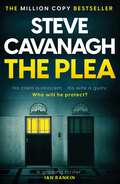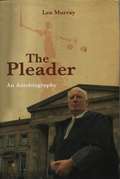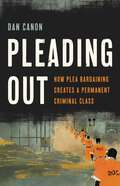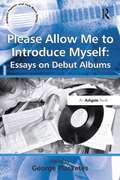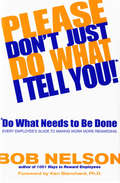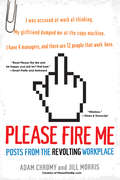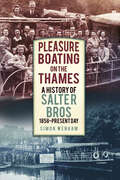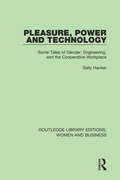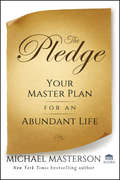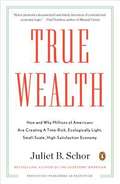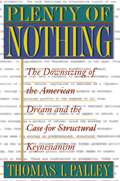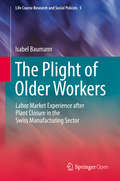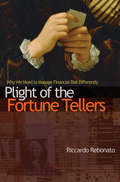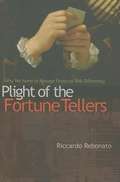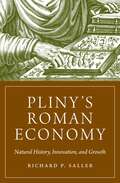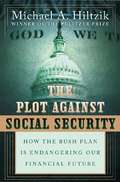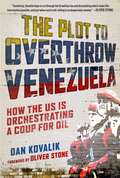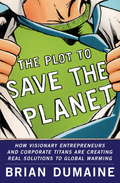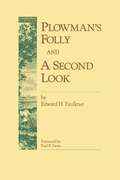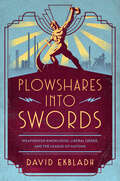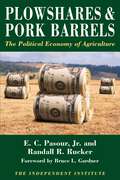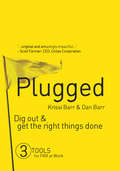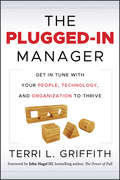- Table View
- List View
The Plea: His client is innocent. His wife is guilty. (Eddie Flynn Series)
by Steve CavanaghYour client is innocent. Your wife is guilty.Who would you fight for?*'Quite simply, THE PLEA is one of the most purely entertaining books you'll read this year' John Connolly'A gripping thriller' Ian Rankin*When David Child, a major client of a corrupt New York law firm, is arrested for murder, the FBI ask con artist-turned-lawyer Eddie Flynn to persuade him to testify against the firm.Eddie is not someone who is easily coerced, but when the FBI reveal that they have incriminating files on his wife, he knows he has no choice.But Eddie is convinced the man is innocent, despite overwhelming evidence to the contrary. With the FBI putting pressure on him to secure the deal, Eddie must find a way to prove his client's innocence.But the stakes are high - his wife is in danger. And not just from the FBI . . .*Praise for race-against-time legal thriller writer, Steve Cavanagh:'A fantastic thriller writer' Mark Billingham'Cavanagh stands head and shoulders above the competition, with his skilfully plotted, action-packed and big-hearted Eddie Flynn novels . . . highly intelligent, twist-laden and absolutely unputdownable' Eva Dolan, author of the critically acclaimed Tell No Tales'What a thriller! Breathlessly brilliant and fiendishly clever' Miranda Dickinson'A cleverly constructed legal thriller combined with a classic locked-room mystery. Eddie Flynn is fast becoming one of my favourite fictional heroes and Cavanagh one of my favourite thriller writers.' S.J.I. Holliday, author of Black Wood'Raymond Chandler could have created Eddie Flynn. THE PLEA is Phillip Marlowe and Michael Connolly's Mickey Haller combined, with a bit of Jim Thompson's THE GRIFTERS thrown in. A superb read with a main character destined to be one of the most talked about in crime fiction.' Howard Linskey, author of The Search*If you like John Grisham, Lee Child and Michael Connelly, you will LOVE the gripping and twisty Eddie Flynn series:1. The Defence2. The Plea3. The Liar4. Thirteen* Each Eddie Flynn thriller can be read as a standalone or in series order *
The Plea: His client is innocent. His wife is guilty. (Eddie Flynn Series)
by Steve CavanaghYour client is innocent. Your wife is guilty.Who would you fight for?*'Quite simply, THE PLEA is one of the most purely entertaining books you'll read this year' John Connolly'A gripping thriller' Ian Rankin*When David Child, a major client of a corrupt New York law firm, is arrested for murder, the FBI ask con artist-turned-lawyer Eddie Flynn to persuade him to testify against the firm.Eddie is not someone who is easily coerced, but when the FBI reveal that they have incriminating files on his wife, he knows he has no choice.But Eddie is convinced the man is innocent, despite overwhelming evidence to the contrary. With the FBI putting pressure on him to secure the deal, Eddie must find a way to prove his client's innocence.But the stakes are high - his wife is in danger. And not just from the FBI . . .*Praise for race-against-time legal thriller writer, Steve Cavanagh:'A fantastic thriller writer' Mark Billingham'Cavanagh stands head and shoulders above the competition, with his skilfully plotted, action-packed and big-hearted Eddie Flynn novels . . . highly intelligent, twist-laden and absolutely unputdownable' Eva Dolan, author of the critically acclaimed Tell No Tales'What a thriller! Breathlessly brilliant and fiendishly clever' Miranda Dickinson'A cleverly constructed legal thriller combined with a classic locked-room mystery. Eddie Flynn is fast becoming one of my favourite fictional heroes and Cavanagh one of my favourite thriller writers.' S.J.I. Holliday, author of Black Wood'Raymond Chandler could have created Eddie Flynn. THE PLEA is Phillip Marlowe and Michael Connolly's Mickey Haller combined, with a bit of Jim Thompson's THE GRIFTERS thrown in. A superb read with a main character destined to be one of the most talked about in crime fiction.' Howard Linskey, author of The Search*If you like John Grisham, Lee Child and Michael Connelly, you will LOVE the gripping and twisty Eddie Flynn series:1. The Defence2. The Plea3. The Liar4. Thirteen* Each Eddie Flynn thriller can be read as a standalone or in series order *
The Pleader: An Autobiography
by Len MurrayLen Murray, described by a High Court judge as the most respected pleader of his generation, practised as a solicitor in Glasgow for over 40 years. As part of a triumvirate of top lawyers based in the city during its period of renaissance, he built up one of the most respected law practices in the country. Among the benchmark cases with which Murray was involved was that of Tony Miller, one of the last people to be hanged in Scotland. Despite a desperate appeal by Murray, the 19-year-old was sent to his death on 22 December 1960. In his candid account Murray describes both the legal arguments and the personal effect the case had on him.Murray was also involved in bringing the Nazi war criminal Antanas Gecas to justice after his discovery in Edinburgh, he was the only solicitor ever to be retained by both Rangers and Celtic footballers who were accused of assaulting each other during a match at Ibrox, and he made a cheeky defence of famous Beatle Paul McCartney who was arrested on drugs charges. The Pleader recounts these and many more tales of the courts and the characters who inhabited them, whether they sat on the bench or stood in the dock. Reluctant to go public until now, Murray has always upheld the simple tenet that client confidentiality is paramount. His decision to publish his memoirs at this time reflects a feeling that he has a responsibility to new students of law and to old friends to put the record straight on many of the fascinating stories to come before the Scottish courts. From the simplest of violations to the most serious of capital crimes, he opens his amazing and hitherto secret files to the world.
Pleading Out: How Plea Bargaining Creates a Permanent Criminal Class
by Dan CanonA blistering critique of America&’s assembly-line approach to criminal justice and the shameful practice at its core: the plea bargain Most Americans believe that the jury trial is the backbone of our criminal justice system. But in fact, the vast majority of cases never make it to trial: almost all criminal convictions are the result of a plea bargain, a deal made entirely out of the public eye. Law professor and civil rights lawyer Dan Canon argues that plea bargaining may swiftly dispose of cases, but it also fuels an unjust system. This practice produces a massive underclass of people who are restricted from voting, working, and otherwise participating in society. And while innocent people plead guilty to crimes they did not commit in exchange for lesser sentences, the truly guilty can get away with murder. With heart-wrenching stories, fierce urgency, and an insider&’s perspective, Pleading Out exposes the ugly truth about what&’s wrong with America&’s criminal justice system today—and offers a prescription for meaningful change.
Please Allow Me to Introduce Myself: Essays On Debut Albums (Ashgate Popular and Folk Music Series)
by George PlasketesDebut albums are among the cultural artefacts that capture the popular imagination especially well. As a first impression, the debut album may take on a mythical status, whether the artist or group achieves enduring success or in rare cases when an initial record turns out to be an apogee for an artist. Whatever the subsequent career trajectory, the debut album is a meaningful text that can be scrutinized for its revelatory signs and the expectations that follow. Please Allow Me to Introduce Myself: Essays on Debut Albums tells the stories of 23 debut albums over a nearly fifty year span, ranging from Buddy Holly and the Crickets in 1957 to The Go! Team in 2004. In addition to biographical background and a wealth of historical information about the genesis of the album, each essay looks back at the album and places it within multiple contexts, particularly the artist’s career development. In this way, the book will be of as much interest to sociologists and historians as to culture critics and musicologists.
Please Don't Just Do What I Tell You! Do What Needs to Be Done: Every Employee's Guide to Making Work More Rewarding
by Bob NelsonThe author of the million-copy-selling 1001 Ways series shows how to get ahead by fulfilling every employers ultimate expectation. This book contains a clear message: Every boss wants an effective worker to do what most needs to be done without having to be asked. Simple? Perhaps. Easy? Not on your life. But thanks to Bob Nelson, employers and employees everywhere will be empowered by this vital message, and in the process achieve their goals and create a mutually rewarding experience. As brief, to the point, and inspiring as his previous best-selling titles, Nelsons commonsense advice can be applied to any situation, from the mailroom to the boardroom, and is illustrated with a wide array of examples and anecdotes from real life. Helping readers tap into their own intelligence, resourcefulness, and pride, Nelson demonstrates how acts of initiative both big and small can make an enormous difference in the way an employee is viewed--and rewarded--by his or her boss; he also shows how the effects of those actions benefit the entire organization. It's a perfect first day on the job book; a useful resource for any HR department; and a worthwhile investment for anyone who wants to learn more and go farther in a job, in a career, and in life.
Please Fire Me: Posts from the Revolting Workplace
by Adam Chromy Jill MorrisIf you work in the kind of place where your boss's door is always open, the coffee is always refilled, and professionalism reigns, then kindly put down this book and throw yourself off something very tall. If years of being frustrated by arrogant douche bags and mental pygmies have left you ready to burn the world to the ground while laughing, then prepare to discover someone actually has it worse.
Pleasure Boating on the Thames: A History of Salter Bros, 1858-Present Day
by Simon WenhamThe River Thames above London underwent a dramatic transformation during the Victorian period, from a great commercial highway into a vast conduit of pleasure. Pleasure Boating on the Thames traces these changes through the history of the firm that did more than any other on the waterway to popularise recreational boating. Salter Bros began as a small boat-building enterprise in Oxford and went on to gain worldwide fame, not only as the leading racing boat constructor, but also as one of the largest rental craft and passenger boat operators in the country. Simon Wenham’s illustrated history sheds light on over 150 years of social change, how leisure developed on the waterway (including the rise of camping), as well as how a family firm coped with the changes brought about by industrialisation – a business that, today, still carries thousands of passengers a year.
Pleasure, Power and Technology: Some Tales of Gender, Engineering, and the Cooperative Workplace (Routledge Library Editions: Women and Business #5)
by Sally HackerHow are the pleasures of making things work turned into processes of domination? Are there links between gender and military institutions? Does eroticism have something to do with engineering? In this book, first published in 1989, Sally Hacker explores the answers to these and other provocative questions about our attitudes toward work and leisure. Drawing from her broad experience as a sociologist, feminist and student of engineering, Hacker helps us to understand the impact of technology on our society and how feminist principles can be used to make work life more egalitarian and more humane. In the first part of the book, the author examines various examples of the masculinization of power, ranging from military institutions to the mechanisation of farm labour, computer technology and affirmative action. In the second part, Hacker presents the results of her research on Mondragon, the world’s largest cooperative workplace, located in Spain. Hacker reaches surprising conclusions about gender and technology at Mondragon, where, in spite of the community’s egalitarian philosophy, gender inequality was as pervasive as in capitalist and socialist systems.
The Pledge: Your Master Plan for an Abundant Life (Agora Series #21)
by Michael MastersonAn actionable guide for quickly improving one's wealth, personal development, and happiness Successful people don't sit around waiting for everything to be "100%" right or to be "absolutely sure" they will succeed. They don't need absolute assurance, because they realize life doesn't provide any. To get what they want out of life, they set specific goals and put together a formal plan to achieve those goals, one step at a time. Successful people know that the cost of failure is modest compared to that of inaction. Failure means they are smarter the next time. Inaction means there is no next time-there's only a lifetime of regret. In The Pledge: Your Master Plan for an Abundant Life, author Michael Masterson reveals how to become successful-and not just financially, but in every area of life. The book Offers simple tips to making immediate changes and to establishing long-term goals Details strategies on becoming more productive at the office and defeating depression Explains why simplifying goals into four major ones makes them much easier to achieve The Pledge teaches readers how to start and finish projects they have been dreaming about for years, boost confidence, strengthen skills, build wealth, and enjoy life.
Plenitude: The New Economics of True Wealth
by Juliet B. SchorAt a moment of ecological and financial crisis, bestselling author and economist Juliet B. Schor presents a revolutionary strategy for transitioning toward a richer, more balanced life. In Plenitude economist and bestselling author Juliet B. Schor offers a groundbreaking intellectual statement about the economics and sociology of ecological decline, suggesting a radical change in how we think about consumer goods, value, and ways to live. Humans are degrading the planet far faster than they are regenerating it. As we travel along this shutdown path, food, energy, transport, and consumer goods are becoming increasingly expensive. The economic downturn that has accompanied the ecological crisis has led to another type of scarcity: incomes, jobs, and credit are also in short supply. Our usual way back to growth-a debt-financed consumer boom- is no longer an option our households, or planet, can afford. Responding to our current moment, Plenitude puts sustainability at its core, but it is not a paradigm of sacrifice. Instead, it's an argument that through a major shift to new sources of wealth, green technologies, and different ways of living, individuals and the country as a whole can actually be better off and more economically secure. And as Schor observes, Plenitude is already emerging. In pockets around the country and the world, people are busy creating lifestyles that offer a way out of the work and spend cycle. These pioneers' lives are scarce in conventional consumer goods and rich in the newly abundant resources of time, information, creativity, and community. Urban farmers, do-it-yourself renovators, Craigslist users-all are spreading their risk and establishing novel sources of income and outlets for procuring consumer goods. Taken together, these trends represent a movement away from the conventional market and offer a way toward an efficient, rewarding life in an era of high prices and traditional resource scarcity. Based on recent developments in economic theory, social analysis, and ecological design as well as evidence from the cutting-edge people and places putting these ideas into practice, Plenitude is a road map for the next two decades. In encouraging us to value our gifts- nature, community, intelligence, and time-Schor offers the opportunity to participate in creating a world of wealth and well-being. .
Plenty of Nothing: The Downsizing of the American Dream and the Case for Structural Keynesianism
by Thomas I. PalleyBusiness papers today are in a triumphant mood, buoyed by a conviction that the economic stagnation of the last quarter century has vanished in favor of a new age of robust growth. But if we are doing so well, many ask, why does it feel like we are working harder for less? Why, despite economic growth, does inequality between rich and poor keep rising? In this wide-ranging and provocative book, Thomas Palley pulls together many threads of "new liberal" economic thought to offer detailed answers to these pressing questions. And he proposes a new economic model--structural Keynesianism--that he argues would return America to sustainable, fairly shared prosperity. The key, he writes, is to abandon the myth of a natural competitive economy, which has justified unleashing capital and attacking unions. This has resulted in an economy dominated by business. Palley's book, which began as a cover article for The Atlantic Monthly in 1996, challenges the economic orthodoxies of the political right and center, popularized by such economists as Milton Friedman and Paul Krugman. He marshals a powerful array of economic facts and arguments to show that the interests of working families have gradually been sacrificed to those of corporations. Expanding on traditional Keynesian economics, he argues that, although capitalism is the most productive system ever devised, it also tends to generate deep economic inequalities and encourage the pursuit of profit at the expense of all else. He challenges fatalists who say we can do nothing about this--that economic insecurity and stagnant wages are the inevitable results of irresistible globalization. Palley argues that capitalism comes in a range of forms and that government can and should shape it from a "mean street" system into a "main street" system through monetary, fiscal, trade, and regulatory policies that promote widespread prosperity. Plenty of Nothing offers a compelling alternative to conventional economic wisdom. The book is clearly and powerfully written and will provoke debate among economists and the general public about the most stubborn problems in the American economy.
The Plight of Older Workers
by Isabel BaumannThis open access book examines the economic, social, and psychological consequences of manufacturing plant closure at the individual level. Using an original data set of over 1,200 workers from Switzerland who lost their manufacturing jobs after the financial crisis of 2008, the author analyzes the determinants of reemployment, the sector of reemployment, and the change in wages over a two year period. In addition, coverage also explores how plant closure affects the social relationship between a displaced worker and his or her significant other, which includes a discussion of the coping strategies on the household level as well as how changes in a worker's social and occupational life affects overall satisfaction. Readers will discover that the burden of structural change disproportionately falls on the shoulders of workers aged 55 and older who often face substantial barriers when trying to return to employment. A larger portion of this group experience long-term unemployment and those who do manage to find a new job often suffer disproportionate wage loss. This result is intriguing in the context of the current demographic change and contradicts the common assumption that young and low-qualified individuals are at greatest risk of unemployment. Advanced age--and not low education--appears to be the primary obstacle to workers finding job satisfaction after being laid off because of market conditions.
Plight of the Fortune Tellers: Why We Need to Manage Financial Risk Differently
by Riccardo RebonatoToday's top financial professionals have come to rely on ever-more sophisticated mathematics in their attempts to come to grips with financial risk. But this excessive reliance on quantitative precision is misleading--and puts everyone at risk. In Plight of the Fortune Tellers, Riccardo Rebonato forcefully argues that we must restore genuine decision making to our financial planning. Presenting a financial model that uses probability, experimental psychology, and decision theory, Rebonato challenges us to rethink the standard wisdom about risk management. He offers a radical yet surprisingly commonsense solution: managing risk comes down to real people making decisions under uncertainty. Plight of the Fortune Tellers is a must-read for anyone concerned about how today's financial markets are run. In a new preface, Rebonato explains how the ideas presented in this book fit into the context of the global financial crisis that followed its original publication. He argues that risk managers are still stuck in a probabilistic rut, and need to engage with the structural causes of real events.
Plight of the Fortune Tellers: Why We Need to Manage Financial Risk Differently
by Riccardo RebonatoToday's top financial-risk professionals have come to rely on ever-more sophisticated mathematics in their attempts to come to grips with financial risk. But this excessive reliance on quantitative precision is misleading--and it puts us all at risk. This is the case that Riccardo Rebonato makes inPlight of the Fortune Tellers--and coming from someone who is both an experienced market professional and an academic, this heresy is worth listening to. Rebonato forcefully argues that we must restore genuine decision making to our financial planning, and he shows us how to do it using probability, experimental psychology, and decision theory. This is the only way to effectively manage financial risk in a manner congruent with how human beings actually react to chance. Rebonato challenges us to rethink the standard wisdom about probability in financial-risk management. Risk managers have become obsessed with measuring risk and believe that these quantitative results bythemselvescan guide sound financial choices--but they can't. In this book, Rebonato offers a radical yet surprisingly commonsense solution, one that seeks to remind us that managing risk comes down to real people making decisions under uncertainty. Plight of the Fortune Tellersis not only a book for the decision makers of Wall Street, it's a must-read for anyone concerned about how today's financial markets are run. The stakes have never been higher--can you risk it?
Pliny's Roman Economy: Natural History, Innovation, and Growth (The Princeton Economic History of the Western World #113)
by Richard SallerThe first comprehensive study of Pliny the Elder’s economic thought—and its implications for understanding the Roman Empire’s constrained innovation and economic growthThe elder Pliny’s Natural History (77 CE), an astonishing compilation of 20,000 “things worth knowing,” was avowedly intended to be a repository of ancient Mediterranean knowledge for the use of craftsmen and farmers, but this 37-book, 400,000-word work was too expensive, unwieldy, and impractically organized to be of utilitarian value. Yet, as Richard Saller shows, the Natural History offers more insights into Roman ideas about economic growth than any other ancient source. Pliny’s Roman Economy is the first comprehensive study of Pliny’s economic thought and its implications for understanding the economy of the Roman Empire.As Saller reveals, Pliny sometimes anticipates modern economic theory, while at other times his ideas suggest why Rome produced very few major inventions that resulted in sustained economic growth. On one hand, Pliny believed that new knowledge came by accident or divine intervention, not by human initiative; research and development was a foreign concept. When he lists 136 great inventions, they are mostly prehistoric and don’t include a single one from Rome—offering a commentary on Roman innovation and displaying a reverence for the past that contrasts with the attitudes of the eighteenth-century encyclopedists credited with contributing to the Industrial Revolution. On the other hand, Pliny shrewdly recognized that Rome’s lack of competition from other states suppressed incentives for innovation. Pliny’s understanding should be noted because, as Saller shows, recent efforts to use scientific evidence about the ancient climate to measure the Roman economy are flawed.By exploring Pliny’s ideas about discovery, innovation, and growth, Pliny’s Roman Economy makes an important new contribution to the ongoing debate about economic growth in ancient Rome.
The Plot Against Social Security
by Michael A. HiltzikRelentless and ominous, the drumbeat echoes across the land: Social Security is on the verge of bankruptcy. These repeated warnings have become a dismal article of faith for the millions of Americans who pay Social Security taxes and expect to collect benefits someday. But they are flatly untrue. Social Security today is on a stronger financial footing than it has been for decades. The Plot Against Social Security will explain who is really behind the efforts to "reform" this system and will show that the most frequently proposed fix-increased privatization-will damage it beyond repair by undermining retirement security for generations to come. Award-winning journalist Michael Hiltzik also offers a clear set of remedies for those few elements of Social Security that do need repair-proposals that will shore up the most efficient social insurance program in America's history, rather than destroying it in the name of reform.
The Plot to Overthrow Venezuela: How the US Is Orchestrating a Coup for Oil
by Dan KovalikAn in-depth look at the US threat to "save" Venezuela Since 1999 when Hugo Chavez became the elected president of Venezuela, the US has been conniving to overthrow his government and to roll back the Bolivarian Revolution which he ushered in to Venezuela. With the untimely death of Hugo Chavez in 2013, and the election of Nicolas Maduro that followed, the US redoubled its efforts to overturn this revolution. The US is now threatening to intervene militarily to bring about the regime change it has wanted for twenty years. While we have been told that the US’s efforts to overthrow Chavez and Maduro are motivated by altruistic goals of advancing the interests of democracy and human rights in Venezuela, is this true? The Plot to Overthrow Venezuela answers this question with a resounding “no,” demonstrating that: The US’s interests in Venezuela have always centered upon one and only one thing: Venezuela’s vast oil reserves;The US has happily supported one repressive regime after another in Venezuela to protect its oil interests;Chavez and Maduro are not the “tyrants” we have been led to believe they are, but in fact have done much to advance the interests of democracy and economic equality in Venezuela;What the US and the Venezuelan opposition resent most is the fact that Chavez and Maduro have governed in the interest of Venezuela’s vast numbers of poor and oppressed racial groups;While the US claims that it is has the humanitarian interests of the Venezuelan people at heart, the fact is that the US has been waging a one-sided economic war against Venezuela which has greatly undermined the health and living conditions of Venezuelans;The opposition forces the US is attempting to put into power represent Venezuela’s oligarchy who want to place Venezuela’s oil revenues back in the hands of Venezuela’s economic elite as well as US oil companies. The battle for Venezuela which is now being waged will determine the fate of all of Latin America for many years to come. The Plot to Overthrow Venezuela lets readers know what is at stake in this struggle and urges readers to reconsider which side they are on.
The Plot to Save the Planet
by Brian DumaineThe Plot to Save the Planetis an illuminating and inspiring look at the “conspiracy” to make green technology the Silicon Valley of the twenty-first century. How is this new frontier being shaped? Brian Dumaine is your guide in this intriguing look into the very near future. You’ll read about: • The savvy investors: Why Warren Buffett is investing heavily in wind power, and why John Doerr, the venture capitalist and early backer of Google, is saying that “green tech is bigger than the Internet and could be the biggest economic opportunity of the twenty-first century. ” • The cars of the future: The competitively priced plug-in hybrids that will get 60 miles to the gallon, and the battle being waged by fifteen start-ups competing to capture the electric car market. • The fuels without fossils: New sources of energy from plants that could capture a big chunk of the $300 billion U. S. wholesale gasoline market. • The corporate mavericks: Companies such as Duke Energy and GE, who are creating the low-carbon business models of the future, as well as cleaner ways to provide our power needs.
Plowman's Folly and A Second Look
by Edward H. Faulkner Edward H. University of Oklahoma Press Paul B. SearsAs the ruinous Dust Bowl settled in the early 1940s, agronomist Edward Faulkner dropped what Nature magazine termed "an agricultural bombshell" when he blamed the then universally used moldboard plow for disastrous pillage of the soil. Faulkner's assault on the orthodoxy of his day will stimulate today's farmers to seek out fresh solutions to the problems that plague modern American agriculture. Plowman's Folly is bound together here with its companion volume A Second Look.
Plowshares into Swords: Weaponized Knowledge, Liberal Order, and the League of Nations
by David EkbladhAn in-depth look at how the ideas formulated by the interwar League of Nations shaped American thinking on the modern global order. In Plowshares into Swords, David Ekbladh recaptures the power of knowledge and information developed between World War I and World War II by an international society of institutions and individuals committed to liberal international order and given focus by the League of Nations in Geneva. That information and analysis revolutionized critical debates in a world in crisis. In doing so, Ekbladh transforms conventional understandings of the United States’ postwar hegemony, showing that important elements of it were profoundly influenced by ideas that emerged from international exchanges. The League’s work was one part of a larger transnational movement that included the United States and which saw the emergence of concepts like national income, gross domestic product, and other attempts to define and improve the standards of living, as well as new approaches to old questions about the role of government. Forged as tools for peace these ideas were beaten into weapons as World War II threatened. Ekbladh recounts how, though the US had never been a member of the organization, vital parts of the League were rescued after the fall of France in 1940 and given asylum at the Institute for Advanced Study in Princeton. However, this presence in the US is just one reason its already well-regarded economic analyses and example were readily mobilized by influential American and international figures for an Allied “war of ideas,” plans for a postwar world, and even blueprints for the new United Nations. How did this body of information become so valuable? As Ekbladh makes clear, the answer is that information and analysis themselves became crucial currencies in global affairs: to sustain a modern, liberal global order, a steady stream of information about economics, politics, and society was, and remains, indispensable.
Plowshares into Swords: Weaponized Knowledge, Liberal Order, and the League of Nations
by David EkbladhAn in-depth look at how the ideas formulated by the interwar League of Nations shaped American thinking on the modern global order. In Plowshares into Swords, David Ekbladh recaptures the power of knowledge and information developed between World War I and World War II by an international society of institutions and individuals committed to liberal international order and given focus by the League of Nations in Geneva. That information and analysis revolutionized critical debates in a world in crisis. In doing so, Ekbladh transforms conventional understandings of the United States’ postwar hegemony, showing that important elements of it were profoundly influenced by ideas that emerged from international exchanges. The League’s work was one part of a larger transnational movement that included the United States and which saw the emergence of concepts like national income, gross domestic product, and other attempts to define and improve the standards of living, as well as new approaches to old questions about the role of government. Forged as tools for peace these ideas were beaten into weapons as World War II threatened. Ekbladh recounts how, though the US had never been a member of the organization, vital parts of the League were rescued after the fall of France in 1940 and given asylum at the Institute for Advanced Study in Princeton. However, this presence in the US is just one reason its already well-regarded economic analyses and example were readily mobilized by influential American and international figures for an Allied “war of ideas,” plans for a postwar world, and even blueprints for the new United Nations. How did this body of information become so valuable? As Ekbladh makes clear, the answer is that information and analysis themselves became crucial currencies in global affairs: to sustain a modern, liberal global order, a steady stream of information about economics, politics, and society was, and remains, indispensable.
Plowshares & Pork Barrels: The Political Economy of Agriculture
by E. C. Pasour Jr. Randall R. RuckerPlowshares & Pork Barrels provides the historical and economic context necessary to make sense of U.S. agricultural policy and examines possible market-based alternatives that could benefit consumers and ensure the advancement of American agriculture in an increasingly interdependent global economy.Established in 1860, the U.S. Department of Agriculture has grown without cease and is now the most entrenched of all federal agencies. The Farm Bills signed by Presidents Bill Clinton in 1996 and George W. Bush in 2002 only served to further expand this byzantine system. Economists are nearly unanimous in their denunciation of this wasteful and pernicious web of politics. Subsidies for not growing crops are so notorious that they have been the object of biting political satire since their introduction in the 1930s. However, few books have critically analyzed government farm programs in their entirety like Plowshares & Pork Barrels.
Plugged
by Krissi Barr Paul Hersey Dan BarrPart business book, part golf novel, Plugged resonates long afterwards and provides real world lessons that apply to the home, the office or the golf course. Chet McGill, the dedicated vice president of sales at AlphaMax Manufacturing, is under fire - Trident, their biggest client, is being pursued, aggressively, by a new competitor. At the same time, Chet is feeling off-balance as he preps for a golf tournament in which he's partnered with Reggie Ward, Trident's vice president of operations. Faced with big problems and with all eyes on him, Chet learns to get back to what's important to his company, his clients, and himself. Pluggedteaches readers to "shoot for PAR," a simple, proven method to achieve success in just three useful steps - prioritize, adapt, and be responsible. In the spirit of Who Moved My Cheese?, Krissi and Dan Barr offer a simple parable that is engaging, engrossing and empowering.
The Plugged-In Manager
by Terri L GriffithA game-changing approach to managementToo often discussions of management practice focus exclusively on managing people and organizational issues. Rarely, however, do they incorporate a discussion about technology or address all three dimensions in a balanced way. When they do, the result is game changing. In our hypercompetitive environment, those managers who are outstanding at being plugged into their people, technology, and organizational processes simultaneously excel at coming up with effective business solutions. The Plugged-In Manager makes the case that being plugged-in--the ability to see choices across each of an organization's dimensions of people, technology, and organizational processes and then to mix them together into new and powerful organizational strategies, structures, and practices--may be the most important capability a manager can develop to succeed in the 21st century. Step by step Griffith shows you how to acquire this ability.Shows what it takes for business managers to succeed as technology and organizations become more and more complexProfiles exceptional leaders and organizations who are plugged-in, such as Tony Hsieh, CEO of Zappos.comOffers a fresh look at management issuesFilled with compelling case studies and drawing on first-hand interviews, The Plugged-In Manager highlights this often neglected managerial capability and the costs of only focusing on one dimension rather than all three.
